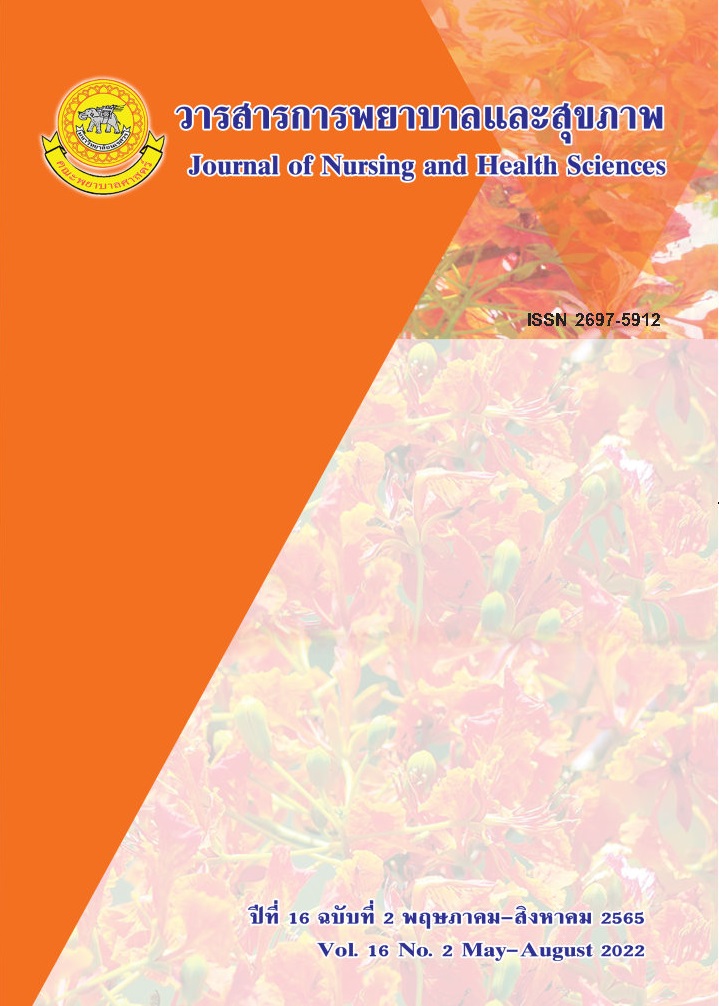Effect of EQ UP Activity throughvia Application Communication on Emotional Quotient amongUniversity Student in Health Promotion Major
Main Article Content
Abstract
This quasi-experimental research aimed to 1) compare the mean scores emotional quotient of the
experimental group and the control group and 2) compare the mean scores emotional quotient of experimental
group before and after participating in the EQ UP activity. The sample was selected purposive sampling
fromthe third-year student Health Promotion Major, Srinakharinwirot University. This sample was divided
into two groups; the experimental group 8 students and the control group 8 students. EQ UP activity develop
based onthe goodness, proficiency, happiness concept of Department of Mental Health. The experimental
group received EQ UP activity through line application for 6 times for 50 minutes each time. The total duration
of the EQ UP activity is 6 weeks. The research instrumentfor data collection was Emotional Quotient test.
Content Validity Index (CVI) = 0.85. Data were analyzed by descriptive statistics consisted of frequency,
percentage, mean, standard deviation.Data were tested using by Mann Whitney U Test and Wilcoxon Signed
Rank Test.
The results indicated that the mean scores emotional quotient after participating activity of the
experimental group ( = 186.00, S.D. = 12.87) was statistically higher than the control group ( = 167.50,
S.D. = 16.95) (p-value < .05). Furthermore, after participating in activity the mean scores emotional quotient
of the experimental group ( = 186.00, S.D. = 12.87) higher than before participating in the activity ( = 162.00,
S.D. = 16.27) (p-value < .05).
In conclusion, EQ UP activity on Line application communication is a convenient channel for using guide
the development of the emotional quotient. In addition, it can foster an emotional quotient for students in the
university.
Article Details

This work is licensed under a Creative Commons Attribution-NonCommercial-NoDerivatives 4.0 International License.
References
Chaiyapan, K. (2006). Group process. Bangkok: Odeon
Store. [in Thai].
Department of Mental Health. (2007). EQ: Emotional
quotient. Nonthaburi: Ministry of Public Health.
[in Thai].
Goleman, D. (1998). Working with emotional intelligence.
New York: Bantam Books.
Kirdpole, W., & Reungsuksud P. (2010). Effects of life
skills development on emotional quotient among
nursing students. Journal of Nursing Science
& Health,33(1), 10-21. [in Thai].
Kolb D. A. Rubin I. M. & Osland J. S. (1991). Organizational behavior an experiential approach (5thed.).
Eagle weed: Prentice hall.
Kuljitjuerwong, S. (2013). LINE - communicating format
on the creativity of smartphone: Benefits and
limits of application. Executive Journal,33(4),
-54. [in Thai].
Lertsahaphan, U., & Pariyatidhammawong, P. (2021)
The development of new generation to drive of
buddhist society. Journal of Graduate MCU
KhonKaen Campus, 8(1), 10-23. [in Thai].
Luenam, A., & Khupakarn, P. (2015). Emotional
intelligence of students in the Faculty of Public
and Environmental Health at Huachiew
Chalermprakiet University. HCU Journal,18(36),
- 170. [in Thai].
Mangkang, A. (2013). Effect of group activity on
emotional intelligence of mattayomsuksa 6
students at Chonkanyanukoonschool Chonburi
province: Apreliminary study. HCU Journal,
(32), 53-72. [in Thai].
Nuchsutham, W., Kaewkunta, P., Somboon, L., Boonthai,
C., & Muangmakham, S. (2018). Effect of
emotional quotient promoting program on
emotional quotient among nursing students.
Nursing Journal,45(1), 110-121. [in Thai].
Piriyakoontorn, S., Balthip, K., Petchruschatachart, U.,
&Tiraphat, N. (2016). Developing a model for
enhancing the goodness, smartness and
happiness of Thai primary school students in
Songkhla province: A participation action
research study. Songklanagarind Journal of
Nursing,36(3), 150-171. [in Thai].
Siriwatchaiporn, R., Sirimai, W., Vanich, W., &
Taksinachanekit, K. (2013). Efficiency of the
emotional quotient development program on
nursing students before graduation under
the project of additionally producing nurses
for southern region of Thailand. Journal of
Boromarajonani College of Nursing, Bangkok.
(2), 113-121. [in Thai].
Sripho, S., Vatanasin, D., & Nabkasorn, C. (2019).
The effect of emotional quotient enhancement
program on mental health among nursing students.
Journal of Phrapokklao Nursing College,30(2),
-87. [in Thai].
Wisalsirirak, A. (2016). Line group use behavior and
small group relational satisfaction of people of
working age in Bangkok area.(Master Thesis
Arts). Thammasat University,Pathum Thani.
[in Thai].


